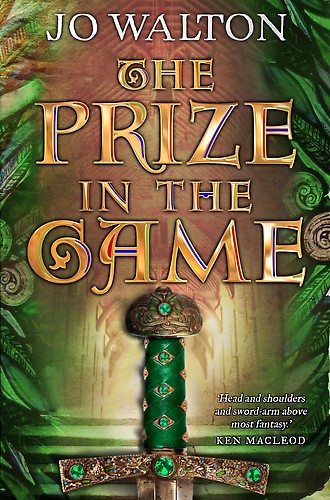Tom Stoppard is definitely a genius; in fact he’s clearly one of those geniuses who are proverbially close to madness.
We saw Dogg’s Hamlet, Cahoot’s Macbeth at the Player’s Theatre in McGill, performed by the same university group who put on The Real Inspector Hound last year. They’re pretty good, they’ve got the timing to play Stoppard, which is the most important thing.
The play opens with adults dressed as schoolchildren talking nonsense — words of English deliberately used to mean something else. The acting is comic, symbolic, exaggerated. The teacher comes in and berated them, there is humour in the word for “sir” apparently being “git”. (This may have been funnier to us that to the rest of the audience, I’m not sure “git” is used in Canada, I haven’t heard it.) Slowly we become aware that we’re starting to understand the language. A guy arrives with a lorry full of stuff to deliver, speaking English, which they don’t understand, and he doesn’t understand them, but he manages to unload his pile of props and help them arrange them. A woman gives a prize-giving speech, and the teacher announced that there will follow a performance of “Hamlet Bedsock Denmark, yeti William Shakespeare.” A brief comic version of Hamlet follows, cut-down but Shakespeare’s English, in the same way a British school might put on a production of Moliere in French. It’s really funny.
This is followed (after a brief encore in which the actors run through it again at top speed, making the “Complete Works of Shakespeare Abridged” version we saw last year seem like plagiarism of this) by an interval in which the three of us sat around speechless with our mouths open, occasionally exchanging words we’d managed to decipher or wondering if the second half was connected.
At first it appeared not to be connected. The scene opens on a suburban living room, with the owner cleaning it. Then actors appear and begin to perform Macbeth — again cut, but played dead straight, apart from the fact that they’re in a suburban living room. The knocking that will wake Duncan comes from the door we all came in through, and reveals a policeman, who reveals, through haranguing cast and audience that we are in Eastern Europe, that we are all dangerous intellectuals watching and performing Macbeth in a living room as an act of subversion and faith in art and the human spirit. He sits down on stage to watch the play, which continues cowed — until the arrival, through the French windows, of the delivery guy with the van, this time speaking the nonsense language. He completely baffles the policeman, but the cast pick it up, Cahoot, one of the actors, explains it’s called Dogg and you don’t learn it, you catch it. Macbeth continues in Dogg, the policeman is drawn in, as MacDuff, the language liberates them, the play moves on with “Burnham” and “Dunsinane” as occasional loan-words in the Dogg, Macbeth begins his famous “Tomorrow and tomorrow and tomorrow” speech “Dominoes, Dominoes, Dominoes” and I understand it perfectly, and the absurd rescues and frees art even as more policemen rush onto the stage and tie up the cast and the first policeman.
Apart from the occasional cross-over absurdity, like the “two-ton artichoke” the guy has parked outside, the second half is played entirely realistically, a million miles from the exaggeration of the first half. And the Macbeth is deadly serious. And art is liberated by nonsense.
This was deeply weird, I’m not sure it entirely worked, I have no desire to see it again but I’m very glad it exists and that I’ve had the chance to see it once.
Wow.



